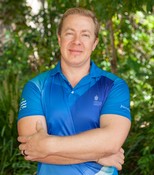
Dr Mark Cyrus ~ Lecturer Aquaculture Macroalgae
Marine & Aquaculture Sciences
- About
-
- Teaching
- Interests
-
- Research
-
- Innovative applications for macroalgae resources, particularly in Integrated Multi Tropic Aquaculture (IMTA)
- Low tropic species development for aquaculture production (particularly Echinoderms)
- Improved sustainability of aquaculture systems
- Experience
-
- 2020 to 2025 - Honorary Research Associate, University of Cape Town (Cape Town, South Africa)
- 2016 to 2022 - Control Scientific Technician, Aquaculture Research & Development, South African Department of Environment, Forestry and Fisheries (Cape Town, South Africa)
- 2016 to 2019 - Honorary Research Affiliate, University of Cape Town (Cape Town, South Africa)
- 2013 to 2016 - Post-Doctoral Fellow, Aquaculture Research & Development, South African Department of Environment, Forestry and Fisheries (Cape Town, South Africa)
- Research Disciplines
- Socio-Economic Objectives
Dr. Cyrus is passionate about preserving the marine environment and its resources, particularly unlocking its’ potential for aquaculture development in a sustainable manner. His research focus is largely on new species development (particularly low tropic species), and the incorporation of macroalgae to improve many aspects of aquaculture production. Including larval settlement, feed development, and the recycling of nutrients for alternative crops through Integrated Multi-Trophic Aquaculture (IMTA).
Dr. Cyrus holds a B.Sc. (Botany), B.Sc. Honours (Ecology), and a Doctoral degree (PhD) in Biological Science (Aquaculture & Phycology) from the University of Cape Town in South Africa. His research focus has largely been in the field of marine aquaculture where he has conducted research on several aquatic species to improve production through the development of innovative culture technologies, including larval rearing techniques, system design, and nutritional research on the development of feeds and feed additives (probiotic and seaweed supplemented diets). This also includes a large focus on the incorporation of macroalgae into many of these technologies and a link to research into integrated multi-trophic aquaculture (IMTA).
Previously he was employed by the South African Department of Forestry, Fisheries and the Environment (DFFE), Directorate: Aquaculture Research & Development based at the “Marine Research Aquarium” in Cape Town.
What is Integrated Multi-Trophic Aquaculture (IMTA)?
Enhanced production of aquatic organisms (with or without terrestrial organisms) of two or more functional groups, that are trophically connected by demonstrated nutrient flows and whose biomass is fully or partially removed by harvesting to facilitate ecological balance.
- Honours
-
- Fellowships
-
- 2013 to 2016 - South African National Research Foundation (NRF) - Professional Development Program (PDP) Fellowship
- 2010 to 2013 - Woolworths/Marks & Spencer PhD Fellowship for Sustainable Seafood’s
- 2008 to 2010 - Woolworths/Marks & Spencer MSc Fellowship for Sustainable Seafood’s
- Publications
-
These are the most recent publications associated with this author. To see a detailed profile of all publications stored at JCU, visit ResearchOnline@JCU. Hover over Altmetrics badges to see social impact.
- Journal Articles
-
- De Vos B, Cyrus M, Bolton J and Macey B (in press) Effect of basket height and stocking density on production of the sea urchin Tripneustes gratilla: insights and recommendations. Aquaculture International,
- De Vos B, Cyrus M, Macey B, Batik T and Bolton J (in press) Combining computer vision and standardised protocols for improved measurement of live sea urchins for research and industry. Aquaculture, Fish and Fisheries,
- Brink-Hull M, Cyrus M, Macey B, Rhode C, Hull K and Roodt-Wilding R (2022) Dietary effects on the reproductive performance of the sea urchin Tripneustes gratilla ll: Implications for offspring performance. Aquaculture, 553.
- Brink-Hull M, Cyrus M, Macey B, Rhode C, Hull K and Roodt-Wilding R (2022) Dietary effects on the reproductive performance of the sea urchin Tripneustes gratilla l: Implications for broodstock conditioning. Aquaculture, 552.
- Onomu A, Vine N, Cyrus M, Macey B and Bolton J (2020) The effect of fresh seaweed and a formulated diet supplemented with seaweed on the growth and gonad quality of the collector sea urchin, Tripneustes gratilla, under farm conditions. Aquaculture Research, 51 (10). pp. 4087-4102
- Cyrus M, Bolton J and Macey B (2019) The use of stable isotope ratios ? 13 C and ? 15 N to track the incorporation of Ulva and other important dietary ingredients into the gonads of the sea urchin Tripneustes gratilla. Aquaculture Nutrition, 26 (1). pp. 174-185
- Bolton J, Cyrus M, Brand M, Joubert M and Macey B (2016) Why grow Ulva? Its potential role in the future of aquaculture. Perspectives in Phycology, 3 (3). pp. 113-120
- Cyrus M, Bolton J and Macey B (2015) The role of the green seaweed Ulva as a dietary supplement for full life-cycle grow-out of Tripneustes gratilla. Aquaculture, 446. pp. 187-197
- Cyrus M, Bolton J, Scholtz R and Macey B (2014) The advantages of Ulva (Chlorophyta) as an additive in sea urchin formulated feeds: effects on palatability, consumption and digestibility. Aquaculture Nutrition, 21 (5). pp. 578-591
- Cyrus M, Bolton J, De Wet L and Macey B (2013) The development of a formulated feed containing Ulva (Chlorophyta) to promote rapid growth and enhanced production of high quality roe in the sea urchin Tripneustes gratilla (Linnaeus). Aquaculture Research, 45 (1). pp. 159-176
Connect with me
- Phone
- Location
-
- 32.017, Sir George Fisher Research Building (Townsville campus)
- Advisory Accreditation
- Primary Advisor
- Find me on…
-




My research areas
Similar to me
-
Prof Dean JerryCollege of Science & Engineering
-
A/Prof Jennifer CobcroftMarine & Aquaculture Sciences
-
A/Prof Matthew TanCollege of Science & Engineering
-
Prof Andreas LopataBiomedical Sciences and Molecular Biology
-
A/Prof Damien ParisBiomedical Sciences and Molecular Biology

